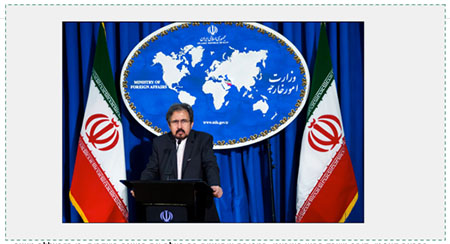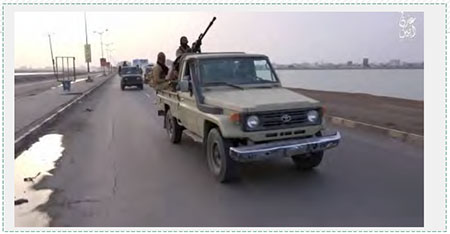
Bahram Qasemi, spokesman for the Iranian foreign ministry, at a press conference, falsely claiming that Hezbollah produced its own weapons and did not need to get them from Iran (Fars, January 23, 2017).
Overview
1. On January 23, 2017, during his weekly press conference, Bahram Qasemi, spokesman for the Iranian foreign ministry, was asked to respond to Israeli accusations that Iran was smuggling weapons to Hezbollah in Lebanon. In response he raised false claims, saying Hezbollah did not need Iranian arms because it was self-sufficient when it came to producing all the weapons and equipment it needed. Hezbollah, he added, was a legitimate political organization in Lebanon and an important part of the "resistance," and had financial resources, equipment and weapons, and could provide for its own needs (Fars in English and Persian, January 23, 2017).
2. Qasemi made the remarks in response to a letter sent by Danny Danon, Israel's ambassador to the UN, to the Security Council, two months earlier.[1] He had alerted the Security Council to the fact that Iran was sending arms and other related material enabling Hezbollah to enlarge its missile arsenal. The weapons and equipment, he said, were packed into suitcases by the Qods Force in Tehran and delivered to Hezbollah operatives on commercial Mahan Air flights to Beirut or Damascus. From there they were transferred overland to Lebanon. The smuggling activities are a serious violation of various UN Security Council resolutions (isicrc.org, January 9, 2017; The Times of Israel and the Facebook page of Danny Danon, November 22, 2016).
3. The claim made by Bahram Qasemi, that Hezbollah manufactures its own weapons and equipment, has no basis in fact. Hezbollah in Lebanon has neither the technology, the manufacturing capabilities nor the trained manpower necessary to manufacture advanced weaponry of the sort Iran provides. The Iranians have been directly and primarily responsible for the construction of Hezbollah's military power, from the organization's inception in 1982 to the present day. Over the years Iran has continually increased both the quantity and quality of the weapons it supplies directly to Hezbollah(with increased range, precision, strength and destructive impact). The weapons are delivered to Hezbollah by Iran, in instances by air from Iran to Damascus, and from they there are sent overland to Lebanon.[2]
4. With Iran's massive support, Hezbollah in Lebanon constructed an extensive military-terrorist infrastructure with a large arsenal of rockets, missiles and other advanced weapons. That was clearly revealed by Hossein Salami, deputy commander of the IRGC, in a speech he gave for Jerusalem Day on July 1, 2016. He said that there were more than 100,000 missiles ready to be fired at Israel. He said Lebanon alone had 100,000. In addition, he said, tens of thousands of long-range missiles were aimed at Israel from other locations in the Muslim world. All of them, he claimed, would "remove Israel from the political geography of the world once and for all" (Fars, July 1, 2016).
5. Bahram Qasemi's claim that Hezbollah had financial resources and could provide for its own needs is patently untrue. His claim directly contradicts a speech made by Hezbollah leader Hassan Nasrallah on June 24, 2016, where he emphasized that American sanctions would have no effect on Hezbollah because all of its budget came from Iran. To illustrate the claim, in an exceptional statement, he described the financial support Iran gave Hezbollah. He said, "Hezbollah's budget, salaries, money, food, drink and weapons all come from Iran." He reiterated, saying that Hezbollah's entire budget came from Iranand that "as long as Iran has money, [Hezbollah] has money." He claimed that even when sanctions had been imposed on Iran, "the money allotted [from Iran] for Hezbollah continued to reach us."[3] He thanked Iranian Supreme Leader Ali Khamenei for supporting Hezbollahthroughout the years of its existence, support, he claimed, which continued to the present day.

Hezbollah leader Hassan Nasrallah speaking on July 24, 2016, claims all Hezbollah's money comes from Iran (al-Ahed, June 24, 2017).
6. Iran's extensive military support and generous funding for Hezbollah are a fundamental part of Iran's regional strategy. Iran uses arms and money to support its proxies and armed militias in the countries where Iran has important interestsand where there are Shi'ite populations or ethnic groups close to Shi'a and Iran (such as the Alawites in Syria, the Zaydi-Shi'ites in Yemen). Iran puts the strategy into practice in Lebanon, Syria, Iraq and Yemen. The IRGC's Qods Force, commanded by Qasem Soleimani, is responsible for distributing support, handling proxies and operating militias in various countries. The Qods Force played a central role in rebuilding Hezbollah's military infrastructure after the Second Lebanon War(2006). That included providing Hezbollah with precise missiles, advanced anti-aircraft systems and Yakhont anti-ship missiles. Hezbollah has an arsenal of more than 100,000 rockets and missiles in Lebanon threatening Israel's military and civilian infrastructureand ready to be used, primarily when the considerations of Iranian strategy deem the time has come.
[1]Iran's immediate response was provided by Gholam-Hossein Dehqani, Iranian ambassador to the UN. He claimed Israel's accusations were "absurd" and baseless, and that Israel was the country involved in terrorism (Press TV, November 23, 2017). However, he did not directly respond to the accusations. Qasemi's remarks were Iran's formal, detailed response to the letter.
[2]Mahan Air is a Iranian commercial airline with ties to the Islamic Revolutionary Guards Corps (IRGC), although theoretically it is privately owned. It has dozens of weekly domestic and foreign flights. In 2011 "the American administration designated Mahan Air according to Executive Order 13224 for providing financial, material and technological support" to the IRGC's Qods Force." (https://www.treasury.gov/press-center/press-releases/Pages/tg1322.aspx). Throughout the past year it has flown flights from Iran to Syria through Abadan on the Persian Gulf coast, on which fighters, weapons and equipment for the Syrian regime and its supporters were seen (Defenddemocracy.org, February 3, 2016).
[3]For further information, see the July 10, 2016 bulletin, "Nasrallah's Speech: Hezbollah's Budget Is Entirely Funded by Iran, Including Weapons and Operatives' Salaries Analysis of Significance and Implications," at http://www.terrorism-info.org.il/en/article/21033










































